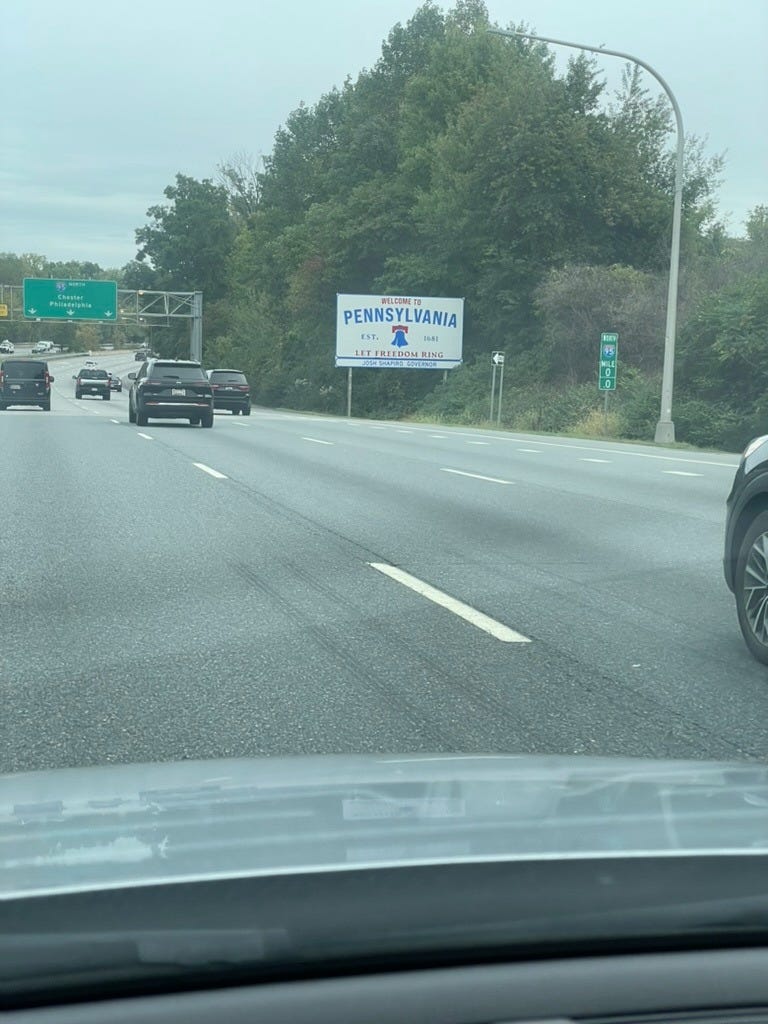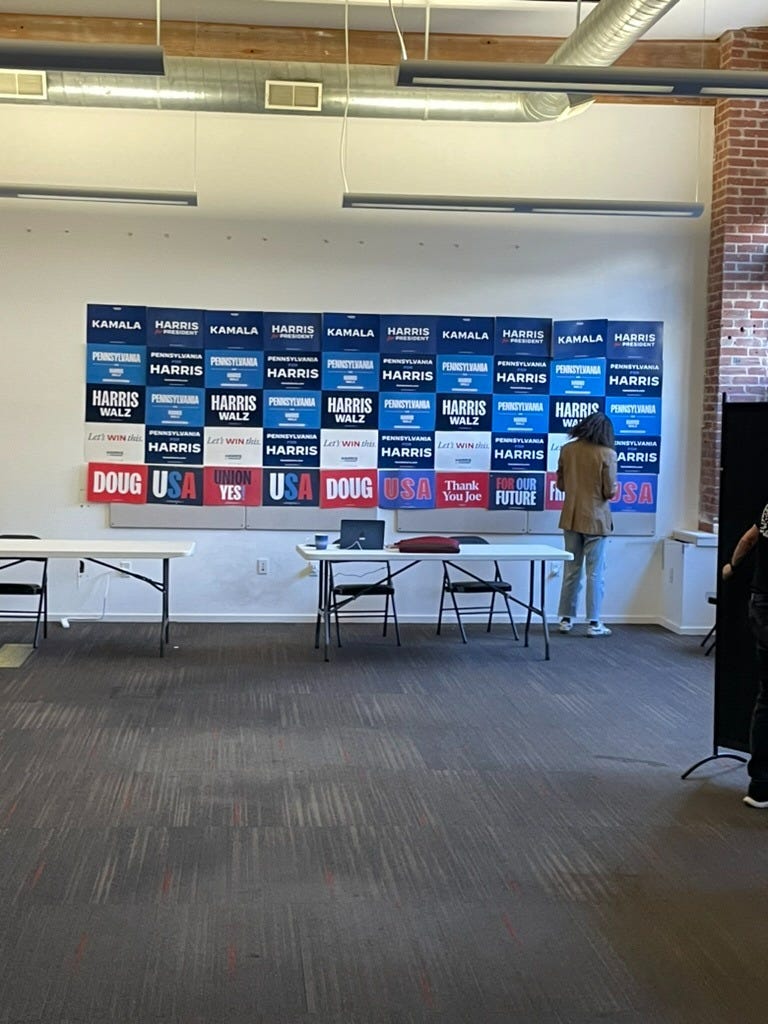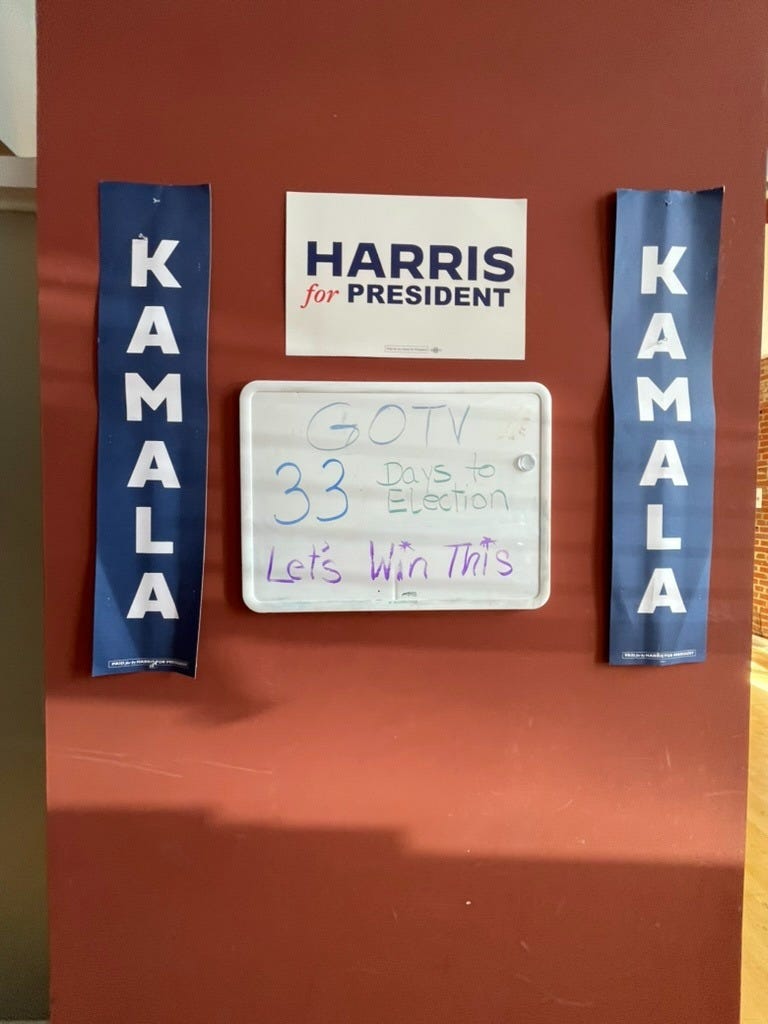35 Days: Part 1
Reflections on my time on the Harris Campaign Pennsylvania GOTV Team one year later. In 35 Days: Part 1: 35 Days, October 2nd, Campaigns at the Macro and Micro Level, and The PA GOTV Team
35 Days
Kamala Harris had 107 days as the Democratic Nominee. I was on the Harris campaign for only 35 days. 35 days running get out the vote in South Philadelphia, the most contested part of the biggest city in the most important swing state in the country.
South Philly was the reddest part of Philadelphia, the rare major urban area that still had a Trump leaning area within it. Unlike other parts of the city, South Philly was not just about pushing up urban Democratic base turnout. It was going to be a street fight. The campaign knew it was going to be a street fight. I was sent there to street fight.
As the one-year anniversary of the 2024 election approaches, I can finally look back on those 35 days with some perspective that only time, even though the loss stings no less. These posts are not an autopsy, a post-mortem, or a report recommending a path forward. They are not a tell all, a list of complaints, or a defense of the campaign. I do not proclaim any wisdom, I only write to share what struck me and what has stuck with me from that campaign a year later.
One of the questions that has become popular to ask staffers and volunteers in the campaign world is “What’s your why?” That is, what is your reason you’re here spending time on a political campaign? For many staffers and volunteers, there’s usually an animating policy issue for them, a personal identity or experience that drives their passion. For the last decade in politics, dislike for Donald Trump and the fear he may end our democracy has also been a driver for many to get involved on the Democratic side. And don’t get me wrong, I care about issues, I dislike Donald Trump, and I had an existential fear for our democracy in 2024 (a correct one as it turned out).
For me the answer is that sometime in the last twenty years I discovered my campaign motto, my life motto, which is simply, “All you can do is all you can do.” I know that in an important election I can only live with myself if, win or lose, if I did everything in my power that I had to give. Honestly, I have too much anxiety during campaign season to sit on the sidelines and just refresh Twitter when I could, should, be doing something. Also, I like to win. And even more than I like winning, I fucking hate to lose.
My lovely wife, a native Philadelphian, knew all this about me. And when on an Obama alumni call in September they asked for experienced people to come to Pennsylvania full-time ASAP, she looked at me and said simply, “You can go.” This was a gesture of true love and support that defines what kind of marriage you are in and want to be in (in true Philadelphia fashion it was followed by a slightly more menacing threat of what would happen to me if I did not win).
So in 2024, “all you can do” for me meant taking a leave from my job, leaving behind my wife and three year-old, moving north, staying in with my in-laws, and returning to the 24/7 campaign life.
Having just turned 40, my time on the campaign was a self-contained mid-life crisis with a clear end date, an escape from my email job, a return to a simpler time in my life when I could pursue something I believed in with the single-minded devotion I had in my youth. Those 35 days on the streets of Philadelphia were some of the longest, hardest, most exciting, and ultimately heartbreaking of my life.
These series of posts are part memory, part perspective, and perhaps part justification to myself that I lived up to my mantra of “all you can do is all you can do,” even though we lost.
Because it turns out, after all that, if you asked me if I would do it all over again if I knew the outcome ahead of time? Absofuckinglutely.
October 2nd
It is October 2nd. I walk my daughter to school for the last time for a while, kiss her goodbye, climb into my car, and head north. I have my first Red Bull of the campaign at 10:44am. I cross the border into Pennsylvania at 11:42am.
I am in a field office. It is a field office I have never been to before. It is every field office that I have ever been to.
The campaign signs taped to the wall in a repeating pattern. The yard signs in the corner. An overworked printer out of paper. Trash cans overflowing with pizza boxes. Folding tables crowded with laptops, cell phones, and power strips.
This is now my office. Or this is my office until I find myself a better one, preferably one located in my turf.
I am now on the Pennsylvania GOTV Team. I am the entire South Philadelphia GOTV team.
What is GOTV? GOTV is the acronym for Get Out the Vote. The phrase means a few different things: As a descriptor, GOTV describes the actions a campaign takes to turn out your supporters to vote for your candidate to try and win an election. As a specific time period, GOTV is the four days before and including election day, including the final weekend. As a job, GOTV is the team responsible for preparing for and executing the final efforts to get supporters to vote in the election. Confused? Much like how fuck is the most versatile word in the english language, during a campaign GOTV is a noun, verb, and an adjective (Fuck is also a word liberally used by GOTV during GOTV for GOTV). GOTV is politics, campaigns, and elections at its most elemental. It is campaigning stripped down to its essence, GOTV is the campaigning that I live for.
There is nothing. My job is to create something. That something is to build the infrastructure for the increasing number of volunteers who will show up as we near election day, culminating in a flood of bodies during GOTV that can number in the thousands, fanning out across South Philly to knock on doors, and delivering the votes that can win the election. In 2020, South Philly provided a good chunk of the votes for Biden’s margin of victory.
As in every field office, there is a countdown on the wall of the number of days until the election. As I get ready to leave from my first day on the campaign we change the count on the whiteboard for tomorrow. 1 day down.
I have 33 days until Election Day.
Campaigns at the Macro and Micro Level
All campaigns, but especially presidential campaigns, are fought on the macro level and the micro level. The macro level is what you’re probably most familiar with of rallies, press events, and billions of dollars in tv and online ads. That’s what most of us see and absorb and the macro campaign is what sets the environment for a race to be won or lost.
The micro level may only be familiar if you live in a swing state or a swing district, that’s where the nitty-gritty work of a campaign occurs through voter contact to persuade people to support a candidate and turn out to vote for them. GOTV is the last stage of the micro level of a campaign, the final culmination of the macro elements into the overwhelming deployment of the micro actions.
Campaigns are composed of all sorts of parts, many of which operate at the macro level (comms, advance, fundraising, rapid-response) but the micro level is run by field, which consists of organizing and GOTV (and also critically logistics/supply). In the modern Democratic Presidential field campaign almost everything done by the campaign in a swing state orients around a single action, knocking on doors to try and talk to voters. Phone calls and text messages to voters have now been outsourced to online volunteers across the country so that for the bodies that are physically in a swing state, there is only one single action that we care about, knocking on doors.
The belief, and the evidence, is that having conversations with voters on their doorstep is the most effective form of voter contact to persuade people to vote for a candidate and then to get them out to actually vote for that candidate.
We call this “canvassing” or “voter contact” or more simply “doors,” the (now digital) address list of doors to knock on is a “packet,” and the time and place where a volunteer takes a packet to knock doors is called a “shift.”
In the Democratic field campaign structure, there are organizers, and there is GOTV.
Organizers or Field Organizers, previously referred to as FOs, are the foot soldiers of organizing. In a model perfected by the Obama 2008 campaign (and not necessarily updated since then) the organizers attempt to recruit volunteers to knock on doors. The volunteers that show interest/talent/availability to do more are asked to take on volunteer leadership roles in the campaign such as helping train other volunteers or canvass (this is known as the ladder of engagement).
The Organizers recruit the volunteers to knock on doors and for most of the campaign are also the ones who manage the door knocking that occurs. But as early voting begins and election day approaches, interest in the campaign naturally rises, and the number of volunteers should rise dramatically and overwhelm the individual organizers.
That’s where GOTV comes in. Our job is to prepare for that Election Day in the future. GOTV is simple but not easy. It is simple because the job is what the name says it is, to get out the vote. It is not easy because the logistics of making that happen are daunting.
My main actual job in GOTV is to find locations to gather, train, supply and launch growing waves of volunteers as election day approaches. Once I find the locations, I have to acquire them, outfit them, supply and constantly resupply them, staff them, run them, and troubleshoot the inevitable logistical complications that come with orchestrating thousands of people.
GOTV is run in a semi-distributed model.
It starts with finding what we call “Staging Locations” (or “SLs”) which are satellite offices that serve as hubs to launch volunteers on their canvass shifts, operating at least on weekends, and often every day, from now until Election Day.
SLs can be churches, union halls, even houses. They need to be set up so that hundreds or even thousands of people can stream into them, get signed in, their assigned packets, trained, materials, and out on the doors as fast as possible.
The ideal SL varies by the terrain of the community its canvassing. In rural or suburban areas, big parking lots are key. In cities, central locations that are walkable with access to public transit but also some parking are key.
Sometimes Staging Locations can be existing campaign offices, but we don’t have one of those in South Philly, so I am going to have to find everything on my own. I don’t really have a budget so I need to convince people that this multi-billion dollar campaign needs them to mostly donate space for free.
Our SLs will be one of dozens of small cogs forming a much bigger GOTV machine that spreads across the entire city of Philadelphia and the Commonwealth of Pennsylvania. This is replicated across every swing state in the country, though it is clear to everyone that Pennsylvania is the prize fight. This is the biggest swing state. The electoral math is difficult to impossible without Pennsylvania. We are campaign ground zero.
The PA GOTV Team
I am part of the Pennsylvania GOTV Team.
We are led by field veterans from 2008 and 2012 who have come back for another in a string of “the most important elections of our lifetime.” We are all on the ground by the beginning of October in vastly different regions in a diverse state.
Organizing is mostly a young person’s game but this GOTV team is more experienced, wiser, well just older. Most of us are campaign veterans of some sort, all of us are professionals in other parts of our lives and careers, and every single one of us believes this election is different. Some, like me, have taken a leave from our day jobs. Others have quit their jobs to do this, not with the expectation that there’s a job in the administration if we win, but just because they want, or the need, to be a part of doing something this election.
There are few jobs where you can take years, or even decades off, and then come back and get into the flow of things pretty quickly. You can do it in GOTV because it turns out that 1) the fundamental action upon which the entire operation is oriented, door knocks and volunteers, has stayed the same and that 2) this is a job about organizing logistics and directing people, both of which are skills that increase with age.
We are the veterans the professional sports team keeps on the roster to provide calm and focus. We are the reservists who have volunteered to come back to active duty for one more tour. We are the tip of the spear, the advance team, the reconnaissance and logistics experts, any number of semi-apt metaphors.
We are, on some level, all kindred spirits despite any differences we may have because we all made ourselves available to move and take a job on short notice, that we know will end soon, with no guarantee of the outcome.
In 2012, the PA regional GOTV directors were on the ground six months to a year ahead of the election. In 2024, we’re here just five or six weeks ahead of the election. GOTV leadership has selected for experience because they know these next few weeks are going to be very intense and they need staff with the confidence to operate alone, to know when to take responsibility for something or when you have to kick a decision up the ladder, and when to say fuck it and make a call.
In addition, we are slightly more experienced than the younger staff on the organizing side. The organizers do not report to us but it’s our job to support, advise, coach, cover, and sometimes layer them. It is a complex relationship in a tough and high-pressure environment but that’s life in the big leagues.
There are 30ish Regional GOTV Directors like me across the state. Roughly one per region. There’s an old story about the Texas Rangers that there’s a prison riot somewhere in Texas and they call the governor for help and he says he’ll send the Texas Rangers. The sheriff goes to the train station and one Texas Ranger steps off the train. “They only sent one Ranger?” the Sheriff exclaims. “One Crisis, One Ranger” is the Ranger’s response. That’s the feeling on the PA GOTV team as we roll into our regions. One region, one GOTV director.
Now the hard work begins.
Tomorrow: The Commonwealth of Pennsylvania, Philadelphia, and South Philly.





